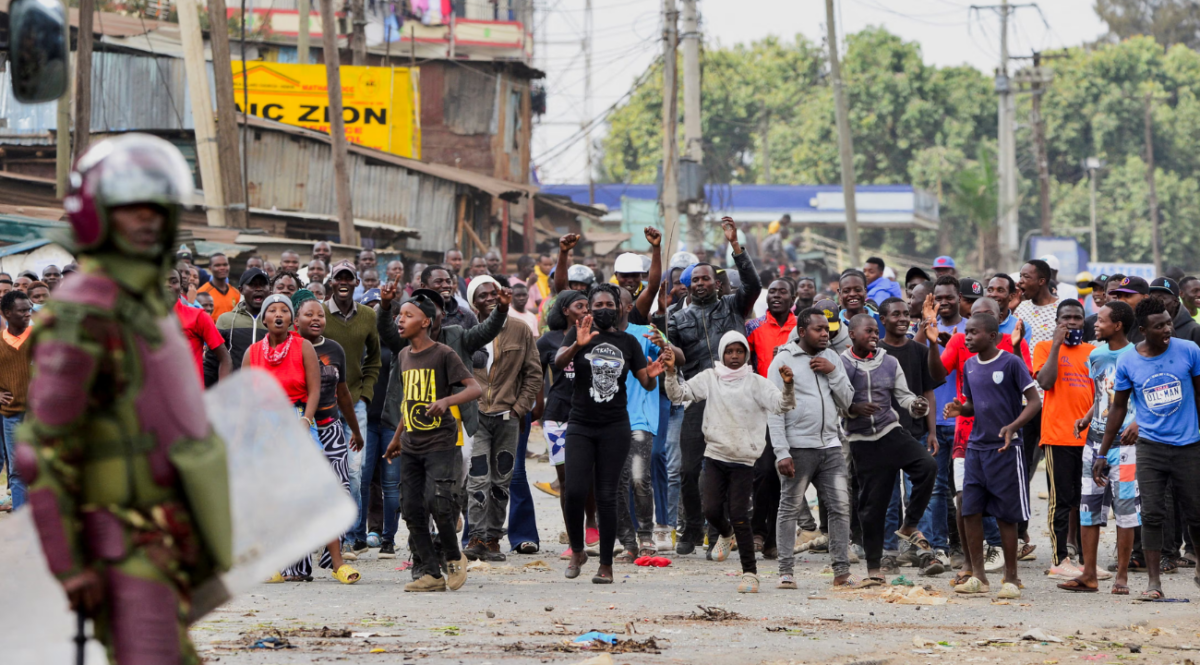Table of Contents
Violent Clashes Erupt in Nairobi and Beyond
Kenya: In Nairobi, on June 25, chaotic scenes unfolded as protests against a proposed tax bill escalated into violence. Demonstrators, angered by the potential tax increases, overwhelmed police forces and attempted to storm the parliamentary compound. Reports indicated that at least five individuals were killed when police opened fire on the protesters. Damage to the parliament building was visible, with parts of it set ablaze, as shown by footage from Citizen TV.
Similar protests and clashes occurred across various cities and towns in Kenya, with demonstrators calling for President William Ruto’s resignation and expressing their opposition to the tax hikes. In Eldoret, Ruto’s hometown, as well as in Mombasa, Kisumu, and Garissa, clashes between police and protesters intensified, leading to widespread unrest.
President Ruto’s Firm Response
In a televised address, President Ruto emphasized that maintaining security was his highest priority. He condemned the violent actions, stating that the tax debate had been “hijacked by dangerous people.” He insisted that it was unacceptable for individuals posing as peaceful protesters to spread terror, and he promised a swift response to what he termed as “treasonous events.”
The Kenya Medical Association reported that five people had died from gunshot wounds, and 31 others were injured, including 13 who were shot with live bullets and four with rubber bullets. The association urged authorities to establish safe medical corridors to protect healthcare workers and ambulances.
Economic Struggles and Tax Hikes
President Ruto, elected almost two years ago with a pledge to aid Kenya’s working poor, now contends with the difficult task of satisfying international lenders like the International Monetary Fund while addressing the needs of a struggling populace. The proposed finance bill seeks to generate an additional $2.7 billion in taxes to help manage Kenya’s significant debt, with interest payments alone accounting for 37% of the annual revenue.
Kenya’s economic challenges have been intensified by the prolonged impacts of the COVID-19 pandemic, the conflict in Ukraine, successive years of drought, and the depreciation of the currency. These factors have resulted in considerable economic strain for many Kenyans, driving the protests against the proposed tax hikes.
International Community and Local Voices
The United States voiced its concern regarding the situation in Nairobi, calling for calm and closely monitoring the unfolding events. In a joint statement, ambassadors and high commissioners from several countries, including the United States, Britain, and Germany, expressed their alarm over the violence seen during the protests and urged all parties to exercise restraint.
Among those affected by tear gas during the demonstrations was Kenyan activist Auma Obama, the half-sister of former U.S. President Barack Obama. Meanwhile, internet services across Kenya faced significant disruptions amid the police crackdown, with Safaricom, the leading network provider, reporting major outages.
Protests Transform into a Broader Movement
Initially centered on opposing the finance bill, the protests have transformed into a broader movement demanding President Ruto’s resignation. Leaders of the opposition have expressed solidarity with the demonstrators; senior opposition figure Eugene Wamalwa urged Ruto to step down, emphasizing the need for integrity. Raila Odinga, another prominent opposition leader, advocated for withdrawing the finance bill immediately to initiate dialogue, expressing dismay over the violence and arrests targeting youths advocating for fair taxation policies.
Despite government concessions, which include promises to eliminate proposed taxes on essential items such as bread, cooking oil, car ownership, and financial transactions, protesters remain dissatisfied. The finance ministry cautioned that these concessions might lead to a significant budget deficit, potentially necessitating further cuts in expenditure or increases in other taxes.
Initially festive, the protests swiftly turned violent in Nairobi’s Central Business District and the Kibera neighborhood when police used tear gas. Similar confrontations unfolded in other cities as demonstrators threw stones at police lines. Driven by an online, youth-led movement without formal leadership, thousands of Kenyan youths have taken to the streets in recent weeks. Their demands have become more assertive, with many calling for substantial reforms and an end to perceived government corruption.
Amid the unrest, Kenya’s sovereign dollar bonds saw a decline, reflecting the economic impact of the ongoing protests.
